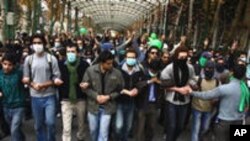<!-- IMAGE -->The Iranian government continues to prevent Iranians from exercising their rights to freedom of expression and assembly. The latest incidents involve what appears to be the violent suppression of protests during National Student Day in Iran.
National Student Day, celebrated this year on December 7, commemorates the deaths of 3 student protestors in 1953 by Iranian government forces under Shah Mohammad Reza Pahlavi. Once encouraged by the Islamic Republic of Iran, the commemoration in recent years has become an occasion for students to voice support for the free exercise of fundamental human rights.
This year, in the aftermath of the massive protests that followed the disputed presidential election in June, the Iranian government tried hard to discourage protests on Student Day. According to reports, in the run-up to the day, the Iranian government arrested scores of student activists throughout the country.
In addition, authorities blocked internet access by drastically reducing web speed, and also warned foreign journalists to keep off the streets for Student Day itself and for 2 days after. Security forces also announced that so-called "illegal" gatherings on December 7 would not be tolerated.
In spite of such measures, thousands of students and other Iranians took to the streets not only in Tehran but in other cities throughout Iran. They were reportedly met by members of security forces wielding batons, chains, tear gas and, in some cases, stun guns. Over 200 people were arrested for peacefully expressing their universal right to
free speech and assembly.
State Department spokesman Ian Kelly expressed concern over the treatment of Iranians by the Iranian government:
"The continued harassment, arbitrary detention and conviction of individuals for their participation in peaceful demonstrations and expression of their views reflect a disregard for the kind of rights enshrined in the Iranian constitution."
As President Barack Obama has affirmed, "The Iranian people have a universal right to assembly and free speech. If the Iranian government seeks the respect of the international community, it must respect those rights, and heed the will of its own people. It must govern through consent, and not coercion." And as Secretary of State Hillary Clinton has stated, "The Iranian government seeks a sense of justice in the world, but stands in the way of the justice it seeks."
National Student Day, celebrated this year on December 7, commemorates the deaths of 3 student protestors in 1953 by Iranian government forces under Shah Mohammad Reza Pahlavi. Once encouraged by the Islamic Republic of Iran, the commemoration in recent years has become an occasion for students to voice support for the free exercise of fundamental human rights.
This year, in the aftermath of the massive protests that followed the disputed presidential election in June, the Iranian government tried hard to discourage protests on Student Day. According to reports, in the run-up to the day, the Iranian government arrested scores of student activists throughout the country.
In addition, authorities blocked internet access by drastically reducing web speed, and also warned foreign journalists to keep off the streets for Student Day itself and for 2 days after. Security forces also announced that so-called "illegal" gatherings on December 7 would not be tolerated.
In spite of such measures, thousands of students and other Iranians took to the streets not only in Tehran but in other cities throughout Iran. They were reportedly met by members of security forces wielding batons, chains, tear gas and, in some cases, stun guns. Over 200 people were arrested for peacefully expressing their universal right to
free speech and assembly.
State Department spokesman Ian Kelly expressed concern over the treatment of Iranians by the Iranian government:
"The continued harassment, arbitrary detention and conviction of individuals for their participation in peaceful demonstrations and expression of their views reflect a disregard for the kind of rights enshrined in the Iranian constitution."
As President Barack Obama has affirmed, "The Iranian people have a universal right to assembly and free speech. If the Iranian government seeks the respect of the international community, it must respect those rights, and heed the will of its own people. It must govern through consent, and not coercion." And as Secretary of State Hillary Clinton has stated, "The Iranian government seeks a sense of justice in the world, but stands in the way of the justice it seeks."













